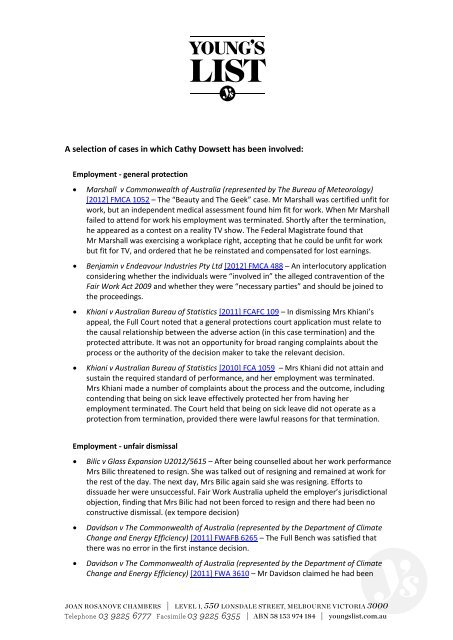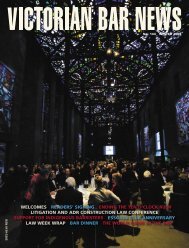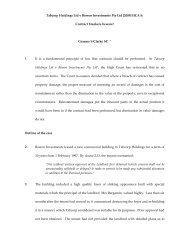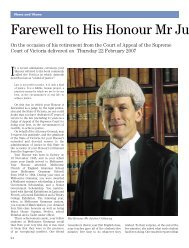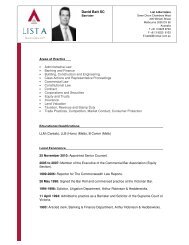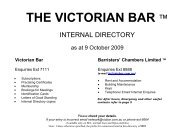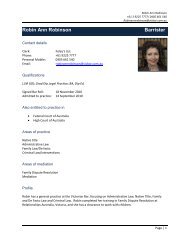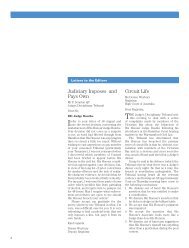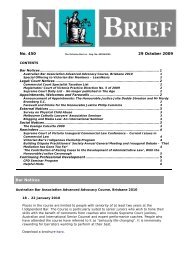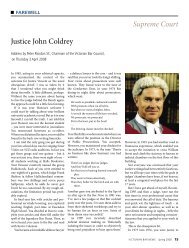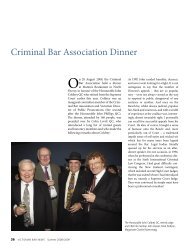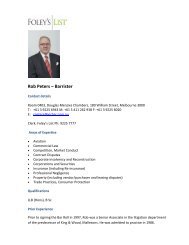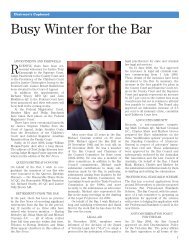A selection of cases in which Cathy Dowsett has been involved:
A selection of cases in which Cathy Dowsett has been involved:
A selection of cases in which Cathy Dowsett has been involved:
Create successful ePaper yourself
Turn your PDF publications into a flip-book with our unique Google optimized e-Paper software.
A <strong>selection</strong> <strong>of</strong> <strong>cases</strong> <strong>in</strong> <strong>which</strong> <strong>Cathy</strong> <strong>Dowsett</strong> <strong>has</strong> <strong>been</strong> <strong>in</strong>volved:<br />
Employment - general protection<br />
<br />
<br />
<br />
<br />
Marshall v Commonwealth <strong>of</strong> Australia (represented by The Bureau <strong>of</strong> Meteorology)<br />
[2012] FMCA 1052 – The “Beauty and The Geek” case. Mr Marshall was certified unfit for<br />
work, but an <strong>in</strong>dependent medical assessment found him fit for work. When Mr Marshall<br />
failed to attend for work his employment was term<strong>in</strong>ated. Shortly after the term<strong>in</strong>ation,<br />
he appeared as a contest on a reality TV show. The Federal Magistrate found that<br />
Mr Marshall was exercis<strong>in</strong>g a workplace right, accept<strong>in</strong>g that he could be unfit for work<br />
but fit for TV, and ordered that he be re<strong>in</strong>stated and compensated for lost earn<strong>in</strong>gs.<br />
Benjam<strong>in</strong> v Endeavour Industries Pty Ltd [2012] FMCA 488 – An <strong>in</strong>terlocutory application<br />
consider<strong>in</strong>g whether the <strong>in</strong>dividuals were “<strong>in</strong>volved <strong>in</strong>” the alleged contravention <strong>of</strong> the<br />
Fair Work Act 2009 and whether they were “necessary parties” and should be jo<strong>in</strong>ed to<br />
the proceed<strong>in</strong>gs.<br />
Khiani v Australian Bureau <strong>of</strong> Statistics [2011] FCAFC 109 – In dismiss<strong>in</strong>g Mrs Khiani’s<br />
appeal, the Full Court noted that a general protections court application must relate to<br />
the causal relationship between the adverse action (<strong>in</strong> this case term<strong>in</strong>ation) and the<br />
protected attribute. It was not an opportunity for broad rang<strong>in</strong>g compla<strong>in</strong>ts about the<br />
process or the authority <strong>of</strong> the decision maker to take the relevant decision.<br />
Khiani v Australian Bureau <strong>of</strong> Statistics [2010] FCA 1059 – Mrs Khiani did not atta<strong>in</strong> and<br />
susta<strong>in</strong> the required standard <strong>of</strong> performance, and her employment was term<strong>in</strong>ated.<br />
Mrs Khiani made a number <strong>of</strong> compla<strong>in</strong>ts about the process and the outcome, <strong>in</strong>clud<strong>in</strong>g<br />
contend<strong>in</strong>g that be<strong>in</strong>g on sick leave effectively protected her from hav<strong>in</strong>g her<br />
employment term<strong>in</strong>ated. The Court held that be<strong>in</strong>g on sick leave did not operate as a<br />
protection from term<strong>in</strong>ation, provided there were lawful reasons for that term<strong>in</strong>ation.<br />
Employment - unfair dismissal<br />
<br />
<br />
<br />
Bilic v Glass Expansion U2012/5615 – After be<strong>in</strong>g counselled about her work performance<br />
Mrs Bilic threatened to resign. She was talked out <strong>of</strong> resign<strong>in</strong>g and rema<strong>in</strong>ed at work for<br />
the rest <strong>of</strong> the day. The next day, Mrs Bilic aga<strong>in</strong> said she was resign<strong>in</strong>g. Efforts to<br />
dissuade her were unsuccessful. Fair Work Australia upheld the employer’s jurisdictional<br />
objection, f<strong>in</strong>d<strong>in</strong>g that Mrs Bilic had not <strong>been</strong> forced to resign and there had <strong>been</strong> no<br />
constructive dismissal. (ex tempore decision)<br />
Davidson v The Commonwealth <strong>of</strong> Australia (represented by the Department <strong>of</strong> Climate<br />
Change and Energy Efficiency) [2011] FWAFB 6265 – The Full Bench was satisfied that<br />
there was no error <strong>in</strong> the first <strong>in</strong>stance decision.<br />
Davidson v The Commonwealth <strong>of</strong> Australia (represented by the Department <strong>of</strong> Climate<br />
Change and Energy Efficiency) [2011] FWA 3610 – Mr Davidson claimed he had <strong>been</strong>
constructively dismissed when his employer commenced an <strong>in</strong>vestigation <strong>in</strong>to a<br />
suspected breach <strong>of</strong> the Code <strong>of</strong> Conduct, suspend<strong>in</strong>g his IT and build<strong>in</strong>g access, and<br />
requested return <strong>of</strong> the departmental Blackberry allocated for his use. Fair Work<br />
Australia rejected Mr Davidson’s claim that he had no choice but to resign.<br />
Workers’ Compensation<br />
<br />
<br />
Briggs v Comcare [2012] AATA 514 – A lengthy delay <strong>in</strong> giv<strong>in</strong>g notice <strong>of</strong> an <strong>in</strong>jury did not<br />
result <strong>in</strong> prejudice to the respondent, accord<strong>in</strong>gly, notice deemed to have <strong>been</strong> given <strong>in</strong><br />
accordance with the Safety, Rehabilitation and Compensation Act 1988.<br />
Peters and Comcare [2012] AATA 636 – Mrs Peters’ claim for compensation was denied<br />
because the events she said caused her psychological <strong>in</strong>jury (the management <strong>of</strong> a return<br />
to work follow<strong>in</strong>g a non-work related <strong>in</strong>jury, her failure to obta<strong>in</strong> a short-term transfer<br />
and a decision not to place her on the “on-call” roster) were found to be reasonable<br />
adm<strong>in</strong>istrative action taken <strong>in</strong> a reasonable manner.<br />
Pilan v Military Rehabilitation and Compensation Commission [2011] AATA 426 –<br />
Mr Pilan’s brief period <strong>of</strong> military service (21 October 1986 to 11 November 1986) was<br />
found not to have <strong>been</strong> a contribut<strong>in</strong>g factor to the development <strong>of</strong> his schizophrenia.<br />
Veterans’ Affairs<br />
<br />
<br />
<br />
Repatriation Commission v Bawden [2012] FCAFC 176 – revers<strong>in</strong>g the decision below, the<br />
Full Court held that the question whether the traumatic event had occurred must be<br />
determ<strong>in</strong>ed to the reasonable satisfaction <strong>of</strong> the decision maker.<br />
Bawden v Repatriation Commission [2012] FCA 345 – This case concerned the standard<br />
<strong>of</strong> pro<strong>of</strong> to be applied when determ<strong>in</strong><strong>in</strong>g whether a veteran is suffer<strong>in</strong>g from Post<br />
Traumatic Stress Disorder (PTSD) for the purposes <strong>of</strong> a claim under the Veterans’<br />
Entitlements Act 1986. The primary judge held that where causation is an element <strong>of</strong> the<br />
diagnostic criteria (as with PTSD) those elements did not need to be established to the<br />
reasonable satisfaction <strong>of</strong> the decision maker, but were to be assessed by reference to<br />
the more generous reverse crim<strong>in</strong>al standard.<br />
Smith v Repatriation Commission [2012] FCA 1043 – A veteran with a history <strong>of</strong> postservice<br />
employment ceased work and subsequently sought an <strong>in</strong>crease <strong>in</strong> his pension to<br />
the a special rate . The Court held that there was no error <strong>in</strong> the Tribunal’s decision to<br />
reject the application for an <strong>in</strong>crease on the basis that the veteran had not <strong>been</strong><br />
genu<strong>in</strong>ely seek<strong>in</strong>g remunerative work dur<strong>in</strong>g the assessment period. Appeal to the Full<br />
Court pend<strong>in</strong>g.<br />
2
Julian v Repatriation Commission [2012] AATA 426 – the Veteran’s accepted hypertension<br />
contributed to the disease from <strong>which</strong> he died (renal failure) but was not the medical<br />
cause <strong>of</strong> his death. Accord<strong>in</strong>gly, the widow’s claim under the Veterans’ Entitlements Act<br />
1986 failed.<br />
Summers v Repatriation Commission [2012] FCAFC 104 – the Tribunal was required to<br />
consider the alternative formulation – that Mr Summers’ response to be<strong>in</strong>g told <strong>of</strong> the<br />
fall when he rega<strong>in</strong>ed consciousness <strong>in</strong> hospital – was the relevant traumatic event.<br />
However there was no evidence that Mr Summers had experienced a response <strong>of</strong> fear,<br />
helpless or horror at the aftermath <strong>of</strong> his fall and therefore no error <strong>in</strong> the approach <strong>of</strong><br />
the Tribunal.<br />
Summers v Repatriation Commission[2011] FCA 1451 – there was no error <strong>in</strong> the<br />
Tribunal’s f<strong>in</strong>d<strong>in</strong>g that an assault followed by a fall from a cliff at Watson’s Bay did not<br />
constituted a “traumatic event” for the purposes <strong>of</strong> the diagnosis <strong>of</strong> Post Traumatic<br />
Stress Disorder <strong>in</strong> circumstances where the veteran had only vague memories or no<br />
recollection <strong>of</strong> the event.<br />
Judicial Review<br />
<br />
Rich v Ingram and others – Dr Rich compla<strong>in</strong>ed <strong>in</strong>ter alia about the validity <strong>of</strong> the<br />
appo<strong>in</strong>tment <strong>of</strong> the Deputy Director <strong>of</strong> the Pr<strong>of</strong>essional Services Review committee that<br />
had made f<strong>in</strong>d<strong>in</strong>gs aga<strong>in</strong>st him. After the proceed<strong>in</strong>gs were commenced, remedial<br />
legislation was enacted. Dr Rich challenged the application <strong>of</strong> the remedial legislation to<br />
his case (decision reserved)<br />
A <strong>selection</strong> <strong>of</strong> <strong>Cathy</strong> <strong>Dowsett</strong>’s recent papers and presentations:<br />
<br />
<br />
Employee, Contractors and Sham Arrangements, co-authored with Mark Felman (Nov<br />
2012)<br />
The Safety Rehabilitation and Compensation Act and the ‘reasonable adm<strong>in</strong>istrative<br />
action’ exclusion (July 2011)<br />
Term<strong>in</strong>ation <strong>of</strong> employment and the Fair Work Act (CPDS) (March 2012)<br />
3


